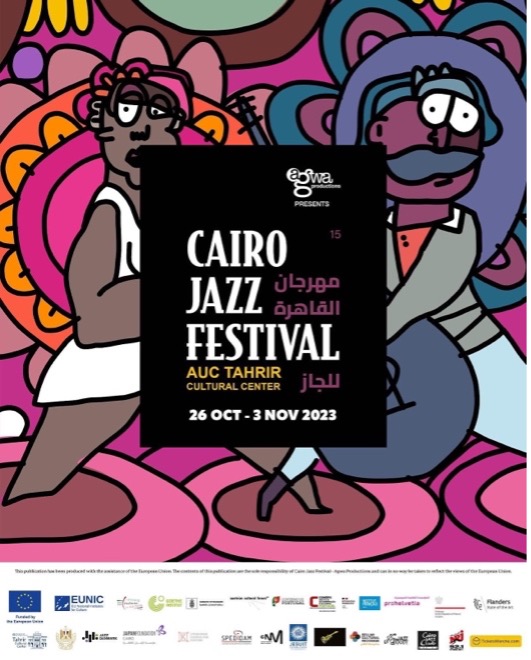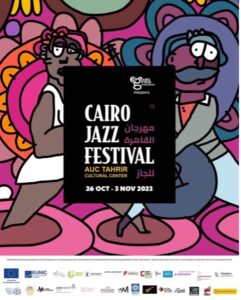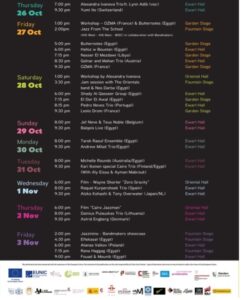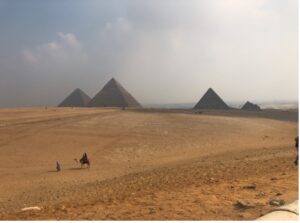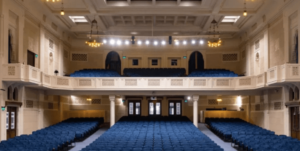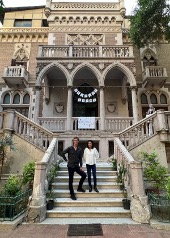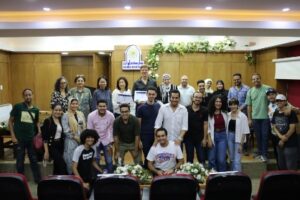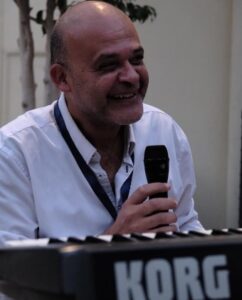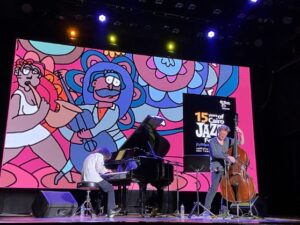#1277 第15回 カイロ・ジャズフェスティバル 2023
The 15th Cairo International Jazz Festival in Egypt, October 26 ~ November 3, 2023
text & photo by Atzko Kohashi 小橋敦子
photo of Festival & workshop by courtesy of Cairo Jazz Festival & Japan Foundation, Cairo
エジプトの首都カイロで10月26日から11月3日までの9日間、第15回 カイロ・ジャズフェスティバルが開催された。カイロ・ジャズと国際交流基金カイロ日本文化センター The Japan Foundation, Cairo の招きで、ベーシストのトニー・オーバーウォーター Tony Overwater と日本×オランダのデュオとして参加するため、アムステルダムからカイロへ向かった。
10月7日に起きたハマスのイスラエルへの襲撃を発端に、イスラエルのガザ侵攻が続く中で中東の状況は不安定だった。連帯感の強いアラブ諸国、その中にはチュニジア、クウェートやオマーン、UAEなど、予定されていた音楽祭、映画祭など芸術イベントを中止・延期する国もあったようだ。キャンセルを支持する声と反対する声、アーティストたちの間でも相反する声があがる中で、カイロ・ジャズフェスティバルは開催に先駆けて、SNSを通じて次のようなメッセージを送った。「愛するパレスチナが絶え間ない苦難に直面する中、私たちは数日後のカイロ国際ジャズフェスティバルの開催に乗り出そうとしています。私たちは、我々を包み込むこの深い悲しみと、日々罪のない人々を殺害する非人道的な犯罪に対する憤りの狭間にいます。このイベントは中止される可能性がありましたが、中止は降伏を意味し、悪に対する善の敗北です。私たちは降伏せず、死なず、この文化的なデモンストレーションを開催して悪に立ち向かうことを主張します。今年のカイロジャズフェスティバルは祝祭ではなく、不正義に対する叫びであり、生きる力の証と考えます」————。
エジプトからガザ地区までは328km(東京〜名古屋とほぼ同距離)だが、幸いにもオランダ〜エジプト間に渡航制限はなく、アムステルダムから約4時間半のフライトでカイロに到着した。10月末だというのに気温は30度を超える真夏の気候だ。市内に入るとすぐにこの街の騒音と不思議な活気に圧倒された。道路にあふれる車から絶え間なく鳴り響くクラクションの音、横断歩道も信号もない場所で車列の合間を縫うように通りを横切る人々、大音量で街に響き渡る日に五回の礼拝への呼びかけ、これがカイロの街の音だ。アラビア語で書かれた全く意味の分からない看板、大きな紙幣の使い慣れないエジプトポンド、見るものも聞こえるものも欧州のどの街とも全く違うのに、なぜか親しみがわく。昔、新宿の裏通りにあったジャズ喫茶を連想させるような煙草の煙のゆらぐカフェもどこか懐かしい。西欧(West)から中東(Middle East)へやって来て、極東(Far East)の国、日本に少し近づいたせいかもしれない。地球儀を指先でちょっと左に回した気がした。
初日は国際交流基金カイロ日本文化センターのコーディネイトで、カイロの音楽学校 Fuculty of Music Education でワークショップを行った。この音楽学校の生徒たちは、伝統的なアラブ音楽を学びながら(これは義務付けられている)西洋クラシック音楽を学ぶ。後にジャズやポップスに移行する人もいるそうだが、どのジャンルであれ個性豊かな自分たちのルーツが音から感じられるのは、自国の伝統楽器、独自の音階を習得しているからだろう。私たちのワークショップのテーマは、1- ジャズはどのように非西洋音階を取り入れてきたか (日本音階を例にとって)。2 – ジャズ演奏での音楽的対話について 。アラビア音楽や日本の伝統音楽にも見られるように、非西洋音楽にはそれぞれの地域独自の楽器を用いながら、歌と楽器が密接な関係にあることが共通している。頭で考える音楽理論ではなく、体温の感じられるようなその旋律に、わけもなく胸がキュンとしたという人も少なくないはずだ。この西洋音階にはない長調、短調の枠を超えた不思議なサウンドに魅了され触発されたジャズミュージシャンは多い。様々な音階を取り入れることで、インプロヴィゼーションでの表現方法がどんどん広がっていく。2番目の「音楽的対話について」では、学生たちに実際にステージで演奏してもらうことにした。「ぜひ演奏させてほしい!」と、ジャズバンドを組んでいるという生徒たちが自主的に参加し、ステージから耳に馴染みのある曲が聞こえてくる。人気のスタンダード曲は洋の東西を問わない。私たちの説明に、時々アラビア語の通訳が入り、生徒たちに伝える。そのアラビア語からも独特の旋律が聞こえてくるようで耳に心地よく響いた。
「不正義に対する叫びであり、生きる力の証」として開催されたこの第15回カイロ国際ジャズフェスティバルには、15か国(エジプト、リビア、オーストリア、ベルギー、フィンランド、フランス、ドイツ、リトアニア、ノルウェイ、ポーランド、ポルトガル、スペイン、スイス、オランダ、日本)から25グループが参加していた(予定されていたデンマークはキャンセル)。メインのコンサート会場は、カイロの街の中心タハリール広場 El-Tahrir Square にあるカイロ・アメリカン大学 AUC Tahrir Square の エワートホール Ewart Hall。1928年創設のこのホールは、かつてルイ・アームストロングが訪れて演奏したという。このほか、屋外ステージとして敷地内の庭園や噴水広場に特設ステージが設置されていた。興味深いのは、個性豊かな独自の音を披露するグループが多いこと。ノースシーやモントルーのような大規模なジャズフェスティバルのようにスーパースターが名を連ねることはないものの、ヨーロッパ各地からのライジング・スターたちが参加している。プログレッシブ・ジャズやエクスプロシブ・ジャズも聞こえる一方で、ペルシャ〜アラブの古典楽器の音色、スペイン語、アラビア語で語られる歌、アラブ、スラブ、バルカンのフォークメロディ、北欧とエジプト音楽のコラボレーションや、私たちのような西洋と東洋のデュオもある。異なる民族の歴史や文化が交差しながら音楽が世界中を旅しているようだ。地理的な要因も大きいのだろうが、古代エジプト、プトレマイオス朝の首都として栄えたアレキサンドリアが 「世界の結び目」と言われたように、こうしてカイロのステージに様々な国から音楽が集まって来る。そして、それらに興味を持ち、暖かく受けとめる観客たち。ミュージシャン、観客、双方の立場に立った主催者側の配慮がしっかりと感じられる。子供たちにもジャズに触れ、演奏する機会を与えたいと、彼らのために “Jazzinino” というキッズ・ジャズプログラムも用意されていた。今回は UAE (アラブ首長国連邦)から将来有望視されている才能あるピアノ少年Ahmed Al-Hashemy 君が参加していたそうだ。
商業主義とは無縁の手作り感のあるカイロ・ジャズフェスティバル、企画・運営に携わる中心メンバーは4人程だという。非営利の組織である上に助成金が’限られているから、自分たちで出来ることは何でもするそうだ。このフェスティバルの創設者でありディレクターであるアムロ・サラー Amro Salah 氏は、「僕はただのピアノ弾きでジャズファンなだけ」と言うが、「ジャズは自由な音楽。ジャズの楽しさとパワーを皆に広めたい。この国にはジャズが必要なんだ」という彼の強い意志のもと、2009年にカイロ・ジャズフェスティバル開催を実現させた。会場の準備はもちろんのこと、ミュージシャンとの出演交渉から宿泊、食事や車の手配まで、当初は全て一人で行っていたという。「ラクじゃないけれど、その後にはグルーヴが味わえるから」だそうだ。2017年には彼の魅力的な人物像とカイロ・ジャズフェスティバルへの情熱をとらえた音楽ドキュメンタリー映画(監督はAtef Ben Bouzid)も制作されている。その中でアムロ・サラー氏は言う。「カイロはクレイジーな街だ。ジャズで言えば、アヴァンギャルド。モダンで奇妙なジャズだ」————と。
11月1日夜、エワートホールEwart Hallで私たちのデュオのコンサートが行われた。ステージから会場の隅々までが見渡せるうえに、観客席からの温かい声援もしっかりとステージに届く。演奏者と聴衆との一体感が感じられて心地よい。コンサートが終わると、音楽学校の生徒やジャズファンの若者たちが感想を伝えに次々にやって来てくれた。”Your music changed my life!” ————長くヨーロッパに住みながら遥か彼方に思えていたエジプト、この一言でグンと距離が縮まった。今、アムステルダムの自宅で、ピラミッドやスフィンクス、そして考古学博物館のファラオのミイラに思いを巡らせながらこの原稿を書いているが、あのカイロの喧騒が不思議なほどに懐かしい。「ナイルの水を飲んだ者は再びナイルに戻る」というエジプトの言い伝えは本当かもしれない。
Cairo Jazzman • Trailer • Feature documentary
Egyptian Jazz Festival: a festival for freedom in Cairo
The 15th Cairo Jazz Festival was held for nine days from October 26th to November 3rd in Cairo, the capital of Egypt. Upon the invitation of Cairo Jazz and The Japan Foundation, Cairo, I flew from Amsterdam to Cairo to participate in the festival as a Japan x Netherlands duo with bassist Tony Overwater.
The situation in the Middle East seemed unstable as Israel’s invasion of Gaza continued, triggered by the Hamas attack on Israel on October 7th. Some Arab countries with a strong sense of solidarity, among them Tunisia, Kuwait, Oman, and the UAE, seemed to cancel or postpone their scheduled music and film festivals and other arts events. Amidst the conflicting voices of support and opposition to the cancellation, even among artists, the Cairo Jazz Festival sent the following message via social media prior to the opening of the festival; “In this terrible ordeal that our beloved Palestine is going through, we find ourselves in a dire position as we are about to embark on this year’s cycle of the Cairo International Jazz Festival in a few days between the deep sadness that engulfs us all and the outrage of all these inhuman crimes that kill innocents daily. This event could have been canceled, but canceling means surrender and the triumph of evil over good and we neither surrender nor die but we insist on our survival by holding this cultural demonstration to defy evil. We will not consider this year’s Cairo Jazz Festival a celebration, but a cry in the face of injustice and an affirmation on the continuity of life.“
It is 328 km from Egypt to the Gaza Strip (about the same distance as from Tokyo to Nagoya). Fortunately, there are no travel restrictions between the Netherlands and Egypt, and I arrived in Cairo after a 4.5-hour flight from Amsterdam. Although it was the end of October, the temperature was over 30 degrees Celsius, making it a midsummer climate. As soon as I entered the city, I was overwhelmed by the city’s noise and mysterious liveliness. The continuous sound of horns from cars on the streets, people crossing the streets without pedestrian crossings or traffic lights, and the loud call to prayer five times a day echoing through the city: these are the sounds of Cairo. Signs written in Arabic that make no sense to me at all, large bills of the unfamiliar Egyptian pound, and the fact that what I see and hear are completely different from those of any European city, yet somehow I feel familiar with the city. The cafes with flickering cigarette smoke, reminiscent of the jazz cafes that used to exist on the back streets of Shinjuku, are also somehow nostalgic. Perhaps it is because I came from the West to the Middle East, and now I am a little closer to Japan, located in the Far East. I felt as if I turned the globe a little with my fingertips to the left.
On the first day, coordinated by the Japan Foundation Cairo-Japan Center, we conducted a workshop at the Faculty of Music Education in Cairo. The students at this music school learn Western classical music while studying traditional Arabic music (which is required). Some of them later move on to jazz or pop music, but no matter which genre they choose, there is a sense of their own unique and individualistic roots in their sound, probably because they have mastered the traditional instruments and unique musical scales of their own country. The themes of our workshop will be: 1- How has jazz adopted non-Western scales (using the Japanese scale as an example) 2- Musical dialogue in jazz performance. As seen in Arab music and Japanese traditional music, non-Western music commonly involves a close relationship between singing and instruments, using unique instruments for each region. Many of you may have experienced the feeling of being touched by the warmth of the melody, which is not based on some heady musical theory but rather on a feeling of body warmth. Fascinated by this mysterious sound that transcends the boundaries of major and minor keys, which is not found in Western scales, many jazz musicians have been inspired by it. In the second part, “Musical Dialogue,” we asked the students to actually perform on stage. ”Let me play !” The students, who are in jazz bands, volunteered to participate, and the stage was filled with familiar tunes. Popular standard songs transcend Western and Eastern boundaries. Occasionally, Arabic interpretation was added to our explanations, conveying the message to the students. The Arabic language itself seemed to have a unique melody that resonated pleasantly in the ears.
The 15th Cairo International Jazz Festival, held as “a cry against injustice and a testament to the power of life,” featured 25 groups from 15 countries (Egypt, Libya, Austria, Belgium, Finland, France, Germany, Lithuania, Norway, Poland, Portugal, Spain, Switzerland, The Netherlands, and Japan), with 25 groups participating. The main concert venue was Ewart Hall at the American University in Cairo (AUC) Tahrir Square, located at the central Tahrir Square in Cairo. This hall was founded in 1928, and Louis Armstrong once visited and performed here. In addition, there were special outdoor stages set up in the gardens and fountain plaza on the grounds. It is interesting to note the many groups that showcase their unique sounds. Although the festival does not feature superstar names like the large jazz festivals in North Sea and Montreux, it does feature rising stars from all over Europe. Alongside progressive jazz and explosive jazz, there are sounds of classical Persian-Arab instruments, songs in Spanish and Arabic, collaborations between Arab, Slavic, Balkan folk melodies, and duos like ours – a collaboration between Western and Eastern music. It seems as if music is traveling around the world, crossing the histories and cultures of different ethnicities. The geographical factor may play a significant role, as ancient Alexandria, the capital of the Ptolemaic dynasty that flourished in ancient Egypt, was referred to as the “knot of the world.” And now, music from various countries gathers on the stages here in Cairo. The audience warmly embraces their music, and the organizers, taking positions from both the musicians and the audience, show thoughtful consideration. For children, a kids’ jazz program called “Jazzinino” was also prepared to give them a chance to experience and play jazz. This time, a promising young piano talent, Ahmed Al-Hashemy, from the United Arab Emirates (UAE), participated.
With a hand-made atmosphere free from commercialism, the Cairo Jazz Festival has a core team of only four people involved in the planning and operation of the festival. The festival is a non-profit organization with limited funding, so they do whatever they can. “I’m just a piano player and a jazz fan,” says Amro Salah, the festival’s founder and director. ”Jazz is free music. I want to spread the joy and power of jazz to everyone. This country needs jazz.”ーHis strong belief resulted in the Cairo Jazz Festival held in 2009. In the beginning, he did everything by himself, including preparing the venue, negotiating with musicians, and arranging lodging, meals, transportation, and etc… It wasn’t easy,” he says, “but there’s a groove you get to savor afterwards. A music documentary film was produced in 2017 (directed by Atef Ben Bouzid) that captures his charismatic personality and passion for the Cairo Jazz Festival. In this film, Amro Salah says, “Cairo is a crazy city. In jazz terms, it’s avant-garde. It’s modern and strange jazz.”
On the evening of November 1st, our duo’s concert took place at Ewart Hall. The stage overlooked every corner of the hall, and the warm cheers from the audience reached the stage. This creates a warm sense of togetherness between the performers and the audience. After the concert, students from the music school and young jazz fans were coming up to us and sharing their impressions of the concert. “Your music changed my life!”—suddenly, Egypt, which seemed so distant while living in Amsterdam, became much closer with these words. Now, at my home in Amsterdam, I’m writing this while reminiscing about the pyramids, the Sphinx, and the mummy of the pharaoh in the archaeological museum, and strangely enough I especially miss the hustle and bustle of Cairo. The Egyptian proverb “Once you drink from the Nile, you are destined to return” might be true.
Atzko Kohashi
小橋敦子、Tony Overwater、トニー・オーヴァーウォーター、カイロ・ジャズフェスティバル、カイロ日本文化センター、アラビア音楽、アムロ・サラー、Atazko Kohashi
